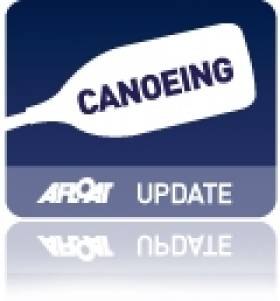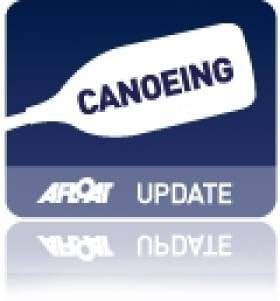Displaying items by tag: Poland
Silver and Bronze for Ireland Rowers at Coupe de la Jeunesse
#Rowing: Ireland took two medals on the second day of the Coupe de la Jeunesse in Poznan, Poland today. The Ireland pair of Tara Hanlon and Amy Mason rowed to a fine second place behind Britain, putting pressure on the long-time leaders coming up to the line. The junior quadruple of Lucy Taylor, Hannah Scott, Fiona Chestnutt and Margaret Cremen took bronze in their final. They were fourth until halfway, but put in a fine second 1,000 metres, taking over a clear third as Italy faded back. Switzerland took gold ahead of Britain.
The junior men’s four finished second in their B Final, and the junior men’s quad were 4th in theirs, one place ahead of the Netherlands.
Coupe de la Jeunesse, Poznan, Poland (Irish interest; selected results)
Day Two
Men
Junior Four - Heat One (First Three to A Final; rest to B Final): 4 Ireland 6:51.55. B Final: 2 Ireland 6:52.17.
Junior Quadruple: Heat Two (First Three to A Final; rest to B Final): 5 Ireland 6:38.47. B Final: 4 Ireland 6:35.36.
Women
Junior Pair (First Three to A Final): 1 Britain 8:03.61, 2 Ireland 8:07.85. A Final: 1 Britain 7:41.82, 2 Ireland 7:43.34, 3 Belgium 7:48.62.
Junior Quadruple (First Three to A Final; rest to B Final): 1 Ireland 7:07.21. A Final: 1 Swit 6:54.88, 2 Britain 6:56.01, 3 Ireland 6:58.11.
Heurteau and Rheinisch Miss Out in One-Shot Heat
# EURO CANOE SLALOM: Ireland’s two competitors in the men’s K1 (racing kayak) at the European Canoe Slalom Championships in Krakow in Poland today came up short of making the final. The programme had to be radically altered because of the recent flooding and only the first 15 of 57 in a single run made it to the final. Ciaran Heurteau was ajudged to have missed the 15th gate and the resulting 50-second penalty ruled him out. However, Eoin Rheinisch was originally in the hunt, initially placing 8th after clocking 91.54 seconds including a two-second penalty for hitting gate 19. But that penalty was upped to 50 seconds and he finished 46th, with Heurteau 47th. Rheinisch’s original run would not have made it in any case as the competitors coming after him pushed him down the field.
Canoe Slalom European Championships, Krakow, Poland, Day One (Irish interest)
Men
K1 Heat One (First 15 to Final): 1 Czech Republic (V Hradilek) 82.96; 46 E Rheinisch 139.54 (89.54 plus 50 sec penalty); 47 C Heurteau 140.20 (86.20 plus 54 sec penalties).
Egan Sets Sights on Olympic Canoeing Spot
#CANOEING - The Evening Herald reports that top Irish canoeist Jenny Egan is headed to Florida for a few months of training towards a spot at the 2012 Olympics.
A sprint and marathon racer, Egan was named as The Irish Times/Irish Sport Council's Sportswoman of the Month for May 2010 in recognition of some very impressive performances.
Indeed, the Kildare native enjoyed much success in 2012, with second place in the 5000m at the World Sprint Cup in the Czech Republic and a new Irish record in the 500m at the Canoe Slalom Worlds in Hungary among her achievements.
Heading into 2012, the Salmon Leap club member will surely be shrugging off setbacks like her crash in the heat and humidity of Singapore at the Canoe Marathon Worlds last October.
The new year brings a new focus, as Egan will concentrate on the 500m and 200m K1 sprint distances for the London games, with the final qualifiers - for just 15 spots - taking place in Poland in April.
The Evening Herald has more on the story HERE.






























































